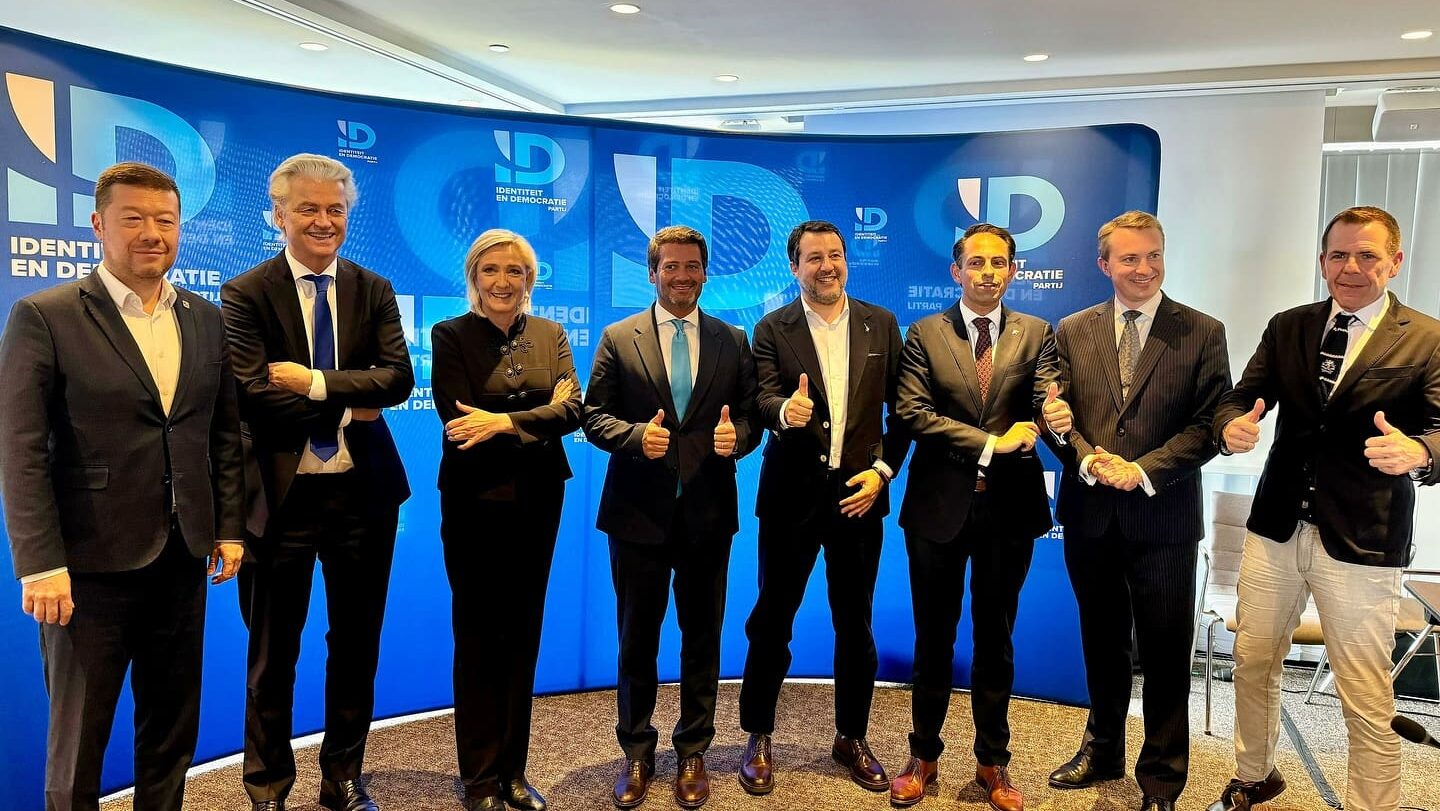
ID leaders’ meeting in Brussels.
Photo: Matteo Salvini on Facebook, 12 June 2024
Leaders of Marine Le Pen’s right-wing populist Identity and Democracy (ID) have begun negotiating their bloc’s future in the European Parliament, including potentially taking on new members and even creating a sovereigntist super-bloc by merging with Giorgia Meloni’s European Conservative and Reformist (ECR) group.
The closed-door meeting took place in a Brussels hotel room on Wednesday, June 12th. Marine Le Pen of the French National Rally (RN), the ID’s de facto head with an astounding 30 seats, reportedly met with Matteo Salvini of the Italian Lega, which gained eight seats, and Geert Wilders of the Dutch Freedom Party (PVV), which secured six seats. Also in attendance were representatives of the Austrian FPÖ (six seats), the Flemish Vlaams Belang (three seats), the Portuguese Chega (two seats), as well as the Czech SPD and the Danish DF (one seat each).
The 2024 EU elections confirmed the voters’ desire for change across Europe, Salvini tweeted, accompanied by a picture of himself and Le Pen. “Macron, Scholz, and Von der Leyen get over it: we want to revolutionize Europe,” the Italian deputy PM added.
A Bruxelles con l’amica e alleata @MLP_officiel, per fare il punto della situazione dopo le elezioni che hanno certificato la voglia di cambiamento dei cittadini di tutto il Continente. Macron, Scholz e Von der Leyen se ne facciano una ragione: vogliamo rivoluzionare l’Europa, in… pic.twitter.com/FEJRWPH37K
— Matteo Salvini (@matteosalvinimi) June 12, 2024
In a statement before the event, Lega confirmed that the party leaders would discuss the possibility of a right-wing alliance between ID and ECR, creating a ‘supergroup’ that would be the second largest in Brussels, rivaling von der Leyen’s centrist EPP.
“ID is in broader negotiations in order to form a big right-wing bloc to fight against corruption, against illegal immigration, and to control our borders,” Chega leader André Ventura told journalists ahead of the meeting. His party is ready to join this hypothetical new formation, he added, but it is also happy just to be part of ID if the merger does not work out.
As Tom Van Grieken, the head of the Flemish delegation also confirmed, the main objective of the meeting was to discuss ways to enlarge the group, either through the merger or simply by admitting new members.
However, ECR members do not necessarily share ID’s enthusiasm for teaming up in the European Parliament. The two groups are politically aligned in most cases but still have some marked ideological differences, especially regarding the war in Ukraine. There are also several domestic rivalries that would make a merger in Brussels difficult, including between Lega and Meloni’s Fratelli d’Italia, the largest delegation of ECR.
Meloni has ample reason not to rush into any decision before the top jobs have been reshuffled in Brussels, and she may have more to gain by staying separate from ID in the long run. That way, she would always have another group further to the Right which helps legitimize ECR by making it appear more mainstream. Meanwhile, she could continue with her delicate balancing act between ID and EPP, cooperating with both whenever the strategic need arises.
Still, Le Pen and her allies will not give up their dream of creating a right-wing super-bloc so easily, at least according to handwritten notes allegedly found by a Politico journalist in the meeting room after the ID leaders left.
The notes featured scribbles including “pressure ECR,” but also talked about the fate of the German AfD—suspended by ID a few weeks ago to give room to the merger—as well as the Hungarian PM Viktor Orbán’s Fidesz, which left the EPP years ago. “AfD after French elections,” one note said, presumably talking about re-admitting AfD’s 15 MEPs in July if the coalition talks with ECR break down.
Another note said “Viktor Orbán new group,” which could either refer to including Fidesz in the new supergroup or discussing whether Orbán would join a hypothetical third sovereigntist group with AfD and the rest of the non-aligned national conservatives under the working name Vera Europa—‘True Europe.’
